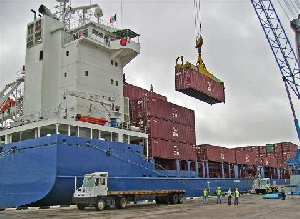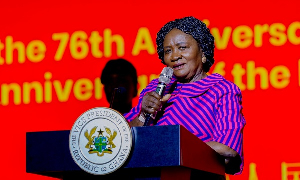Director of Climate and Green Transition at the Danish Maritime Authority (DMA), Jacob Haugaard, has encouraged Ghana to develop a comprehensive roadmap for decarbonising shipping in its maritime sector - to meet the global ‘net zero’ emissions target by 2030 - while emphasising that, Denmark remains committed to supporting the country in building a sustainable and resilient maritime sector.
Mr. Haugaard said this, while giving a presentation at the Ghana Maritime Authority, and Denmark Maritime Authority’s (GMA-DMA) Green Shipping Workshop held in Accra.
In demonstrating Denmark’s commitment to this course, he said that, its Maritime Authority- DMA, has trained several Ghanaian pilots and tugboat masters with the Danish national pilot service, Danpilot.
This, initiative according to him aimed at ensuring that, the Ghana Ports and Harbours Authority (GPHA) was well equipped to handle the increasingly larger container vessels that were calling to port at the new Terminal 3 in Tema.
Additionally, he said the DMA has established an online navigational platform, and has incorporated digital solutions for the promulgation of maritime safety information and the use of e-Navigation.
Further touting its achievements, Haugaard stated that, the DMA gathered key maritime stakeholders from all over the African continent in February last year to discuss the green transition, including opportunities and challenges for the region.
Also, he stated that it organised a green port management study trip to Denmark- visiting Danish ports that are utilizing cutting edge green technology.
“The authority held a two-week train-the-trainer workshop at the Regional Maritime University focusing on safety for fisherfolk,” he moreover said.
However, he said that in order for the country to become climate neutral, it must prioritize the usage of alternative fuels, while aiming to be energy efficient.
“Ghana cannot achieve climate neutrality without alternative fuels. Denmark will therefore continue to collaborate with Ghana to help it become carbon neutral,” he added.
The workshop aimed to explore the country’s preparedness for the green transition in shipping, exchange best practices, and discuss shared challenges and opportunities in advancing its green agenda, among others.
Also, it forms part of an ongoing GMA-DMA Strategic Sector Cooperation (SSC)- a project which has witnessed fruitful collaboration between them since 2015.
The project is funded by Danish international development aid, and focuses on technical capacity building and knowledge exchange. It is currently in its third and final phases- ending in March of next year.
While its previous phases focused on supporting the country’s maritime authority in promoting navigational safety, compliance with international standards and ensuring safe and efficient port management- the project’s current phase focuses on promoting green growth in its maritime sector.
Meanwhile, Director of Maritime Services at GMA, Nana Kwabena Boakye-Boampong, in a keynote address at the event, urged the nation to embrace green technologies, digitalization, and international collaboration to build resilience and sustainability in its maritime sector- while ensuring that it remains aligned with global standards.
To decarbonise, he said that, there is a need for the country to build new ships with clean fuel technology, while existing ones undergo retrofitting.
“Ports will need to “go green” by modernizing their infrastructure and operations to support a more sustainable ecosystem. The availability of “Zero or Near-Zero” fuels (ZNZs) is essential, and the maritime workforce, including seafarers, must receive appropriate training and upskilling to manage these new technologies effectively, ensuring a safe and healthy environment during the transition,” he added.
Also, he acknowledged that maritime transport is the backbone of global trade, but said it poses significant environmental challenges.
“Increased carbon emissions from longer shipping routes and faster sailing speeds to meet service demands are compounding these challenges. Shipping currently represents about 3 percent of all global greenhouse gas emissions. The urgency to reduce these emissions and shift away from traditional fossil fuels has never been more critical,” he elaborated.
Furthermore, he said that, the success of the nation’s efforts to transition to green shipping will largely depend on effective collaboration across the entire maritime, port, and fuel value chains.
“The requirements for decarbonisation are complexly interlinked, and addressing them requires coordinated efforts from all stakeholders involved.”
The International Maritime Organization (IMO) has set ambitious targets in its 2023 Greenhouse Gas (GHG) Strategy. By 2030, it aims to reduce CO2 emissions by 20 percent- striving for 30 percent and the uptake of Zero or Near-Zero (ZNZ) technologies and fuels to 5 percent.
Watch the latest edition of BizHeadlines below:
Click here to follow the GhanaWeb Business WhatsApp channel
Business News of Friday, 1 November 2024
Source: thebftonline.com













